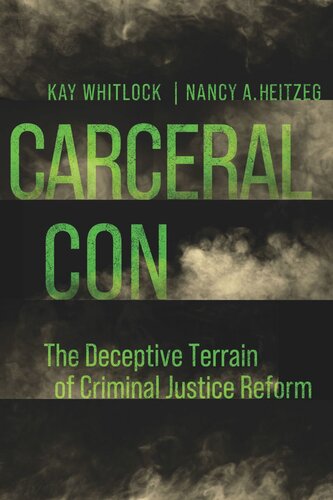

Most ebook files are in PDF format, so you can easily read them using various software such as Foxit Reader or directly on the Google Chrome browser.
Some ebook files are released by publishers in other formats such as .awz, .mobi, .epub, .fb2, etc. You may need to install specific software to read these formats on mobile/PC, such as Calibre.
Please read the tutorial at this link: https://ebookbell.com/faq
We offer FREE conversion to the popular formats you request; however, this may take some time. Therefore, right after payment, please email us, and we will try to provide the service as quickly as possible.
For some exceptional file formats or broken links (if any), please refrain from opening any disputes. Instead, email us first, and we will try to assist within a maximum of 6 hours.
EbookBell Team

0.0
0 reviewsA critical examination of how contemporary criminal justice reforms expand rather than shrink structurally violent systems of policing, surveillance, and carceral control in the United States.
Public opposition to the structural racist, gendered, and economic violence that fuels the criminal legal system is reaching a critical mass. Ignited by popular uprisings, protests, and campaigns against state violence, demands for transformational change have escalated. In response, a now deeply entrenched so-called bipartisan industry has staked its claim to the reform terrain. Representing itself as a sensible bridge across bitterly polarized political divides and party lines, the bipartisan reform industry seeks to control the nature and scope of local, state, and federal reforms. Along the way, it creates an expanding web of neoliberal public-private partnerships, with the promotion and implementation of efforts managed by billionaires, public officials, policy factories, foundations, universities, and mega nonprofit organizations. Yet many bipartisan reforms constitute deceptive sleights of hand that not only fail to produce justice but actively reproduce structural racial and economic inequality.
Carceral Con pulls the veil away from the reform public relations machine, providing a riveting overview of the repressive US carceral state and critical examination of the reform terrain, quagmires, and choices that face us. The book vividly illustrates how contemporary bipartisan reform agendas leave the structural apparatus of mass incarceration intact while widening the net of carceral control and surveillance. The text also equips readers with information and insights useful for examining the likely impacts of reforms today and in the future. What can we learn from reforms of the past? What strategies hold most promise for dismantling structural inequalities, corporate control, and state violence? What approaches will reduce reliance on carceral control and also bring about community safety? Utilizing an abolitionist lens, Carceral Con makes the compelling case for liberatory approaches to envisioning and creating a just society.